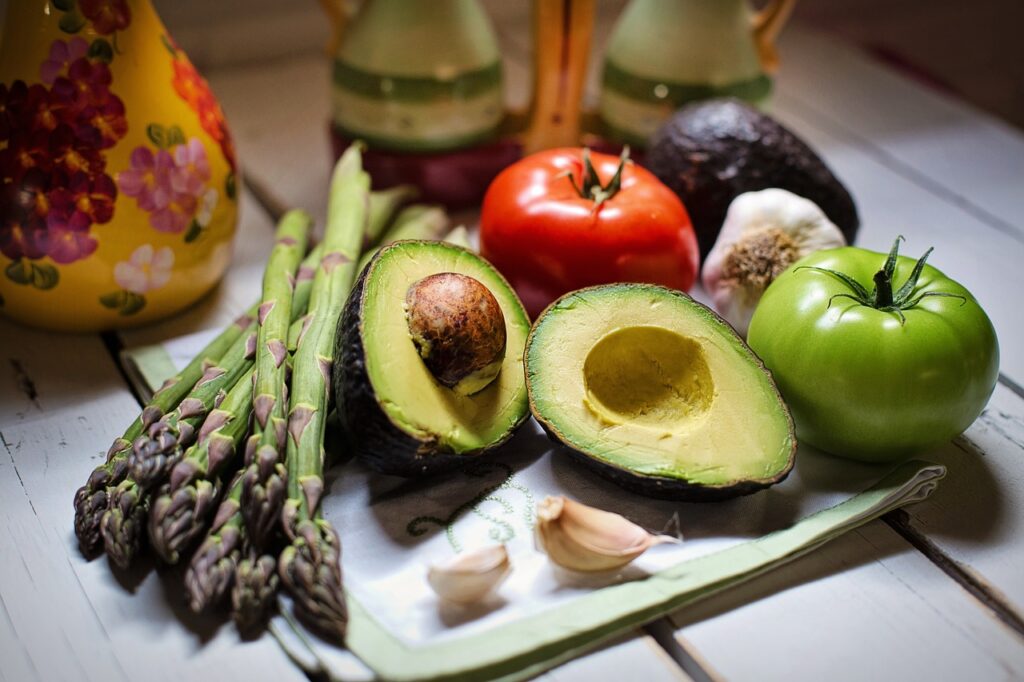The Mediterranean Diet has a vast array of research supporting it, is easy to follow and is a balanced, whole-food focused diet supportive of improving health. Plant- based eating has beneficial effects on health including reducing the risks of chronic diseases such as cardiovascular disease, high cholesterol, and diabetes, whilst being high in fibre to support digestive system health. The key focuses of both these diets are on cooking wholesome meals, utilising whole grains, avoiding processed foods, consuming lots of fruits and vegetables, and eating locally and seasonally where possible.
The basis of the diet
A vegan Mediterranean diet focuses on abundant amounts of fresh vegetables, fruit, whole-grains, nuts, seeds and legumes. Extra virgin olive oil is the predominant oil used and overall the diet focuses on consuming minimally processed plant-based foods. Dairy, eggs, fish and poultry are to be eaten in less frequently, with red and processed meat to be consumed infrequently, with the diet predominantly being plant-based. Added sugars are to be avoided, with only small amounts to be consumed occasionally.
Alcohol is consumed in small amounts, with wine as the main source of alcohol and to be drunk in moderation with meals.
The Mediterranean diet also emphasises eating meals with others and sharing the cooking experience, whilst recommending daily movement and exercise.
Foods to focus on
- Fresh fruits and veggies, especially avocado and leafy greens
- Whole grains – oats, quinoa, bulgur, farro, freekeh, sourdough wholegrain breads, barley
- Legumes and beans
- Nuts and seeds
- Olive oil
- Herbs and spices
The Benefits
- Reduced risk of developing certain cancers and reduced mortality
- Reduced inflammation and oxidative stress
- Reduced risks of stroke, cardiovascular disease and cognitive impairments
- Potential for improved asthma control
- Improved weight control and management
- Improved lipid profiles (cholesterol, LDL, HDL) and blood pressure
- Reduced risks of diabetes and improved glucose regulation
- Improvements in cognitive function and reduced cognitive impairments
- Improved liver health and reduced risks of fatty liver disease
Nutrient Profile
Following this diet style results in high intakes of polyunsaturated and monounsaturated fatty acids whilst being low in sodium, and inflammatory saturated and trans fats. High fibre intakes results in reduced insulin resistance, inhibition of cholesterol absorption from food and reduced cholesterol synthesis to improve cardiovascular health and lipid levels.
When followed well it provides excellent sources of omega 3’s, fibre, antioxidants, and phytochemical’s. Consuming a wide variety of fruits and veggies increases your antioxidant intakes which support in preventing cellular and DNA damage. The foods mainly eaten tend to have low glycemic indexes and loads, meaning it supports in regulating blood glucose levels.
It provides rich sources of micronutrients and vitamins, and is high in vitamins A, C, E, K, the B vitamins, as well as magnesium and calcium.
Meal ideas
Breakfast
Soaked rolled oats and chia seeds in oat/almond/soy/coconut milk served with unsalted raw nuts and seeds, raspberries, blueberries, strawberries, dried apricots/dates and almond butter.
A protein rich smoothie including frozen berries, banana, non-dairy milk of choice, nut butter, protein powder, a handful of spinach, cinnamon, and oats.
Lunch
A quinoa salad with chickpeas, grilled tofu, avocado, tomatoes, spinach, broccoli, corn and a tahini dressing using tahini, olive oil, herbs and lemon juice.
Whole grain sourdough bread served with avocado, tahini/hummus, fresh tomatoes, olive oil, olives, chickpeas and dukkah.
Dinner
Veggie, lentil and quinoa packed soups
Vegetable and tempeh/tofu stir fry with brown rice/soba noodles. Include veggies such as broccoli, carrots, capsicum, mushrooms and snow peas as well as lots of garlic, ginger, chilli and tamari.
Chickpea flour omelettes with tofu, broccoli, spinach, tomatoes and avocado.
Snack ideas
Veggie sticks (carrot, cucumber, capsicum, celery) with wholegrain crackers and hummus
Date, nut and seed protein balls
Soy/coconut sugar free yogurt with berries, nuts and seeds
—
If you’re wanting some extra support with your diet or think you’re lacking certain nutrients check in with one of our naturopaths, Candace or Monique for a consult.

